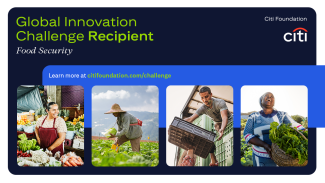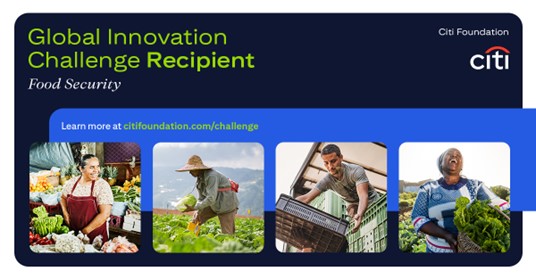
Singapore Management University’s (SMU) Lien Centre for Social Innovation (LCSI) has been awarded a US$500,000 grant by Citi Foundation in its first-ever Global Innovation Challenge, to address food insecurity across lower income households in Singapore. SMU also holds the privilege of being the sole grantee from Singapore among 50 community organisations that Citi Foundation named in its worldwide initiative of US$25 million to strengthen food security and the financial health of low-income families and communities.
Tibor Pandi, Citi Country Officer for Singapore, spoke on Citi’s sustained contribution to the community, “Citi’s mission is to enable growth and progress to our clients and the community, and that commitment has been guiding us in making a positive difference in Singapore since 1902. Through this inaugural Global Innovation Challenge, we will leverage on Citi Foundation’s philanthropic capital to help SMU develop and scale innovative ideas that contribute towards addressing food insecurity issues in Singapore.”
Commenting on the grant, Steve Loh, Executive Director of Singapore Management University’s Lien Centre for Social Innovation said, “The absence of hunger is not the only indicator of food security. For a holistic view, we might want to consider the factors that enable individuals and households to sustain their food-secure status – such as Access, Availability, Utilisation and Stability. We are delighted to partner Citi Singapore in our project to address these and other elements, such as wellbeing, in Singapore’s urban context.”
Citi Foundation’s Global Innovation Challenge: A new model of philanthropy
The inaugural Global Innovation Challenge is Citi Foundation’s new model to identify and provide philanthropic support to community organisations that are developing innovative solutions to social and economic challenges facing low-income communities. Initially previewed at the Global Citizen Festival in New York City last weekend, the first-ever Global Innovation Challenge is providing a total of US$25 million to 50 community organisations, with around 10 based out of APAC, working to improve food security and strengthen the financial health of low-income families and communities around the world.
Each recipient of this inaugural Global Innovation Challenge has been granted US$500,000 to support programming across four key areas: food access, availability, affordability, and community resilience. Innovations range from launching apps that will connect food supply and demand to piloting new technology and sustainable farming practices to setting up urban gardens and more.
In Singapore, SMU Lien Centre for Social Innovation (LCSI) will use the grant to develop an applied research and trial project to assess solutions that address the root causes of food insecurity across local marginalised communities, beginning from January 2024, with the potential of future scalability to other urban contexts.
SMU LCSI: Piloting solutions to address food insecurity across lower income households in Singapore
Food insecurity exists even in food-secure nations like Singapore. As the public and people sectors have done much over the years to increase food support to food-insecure households in Singapore, this project seeks to concentrate efforts on addressing the root causes of food insecurity to develop more sustainable, long-term solutions to this pressing issue.
The project builds on LCSI’s past and current studies on the topic, which found financial constraints to be one of the drivers of food insecurity in Singapore. By delving into and addressing the root causes of food insecurity, the project intends to contribute to Singapore’s social compact and potentially serve to address social inequality.
From LCSI’s research on social inequality, the evidence points to food access remaining a chronic issue to low-income households even in developed, urban economies. The phenomenon may be exacerbated by structural and systemic barriers to upward social mobility, e.g., rapid and uneven economic growth, social inequality, and other factors that may afford little reprieve for socioeconomically disadvantaged families and communities.
In a study on food insecurity in 2019, published in The Hunger Report (2020), LCSI found that 10.4% of the 1,206 sampled Singaporean households experienced food insecurity at least once in the preceding 12 months. This means that an estimated 1 in 10 households did not have or were not confident of having ‘economic and physical access to sufficient, acceptable food for a healthy life’. Of these households, 3.5% reported severe food insecurity, and the remaining 6.9% were classified as moderately food insecure. Household food security status was determined by the number of affirmative responses given to the Household Food Security Survey Module (HFSSM). In the 10-item adult HFSSM, two to five affirmative responses classified a household as moderately food insecure, while six or more would indicate severe food insecurity.
 The project’s approach is a distinct departure from the conventional strategy that relies mostly on food aid distribution, which responds to the apparent ‘deficit’ – hunger. In-depth knowledge of the lived experiences of households will enable LCSI to innovate a solution to a radical challenge facing low-income urban communities with the objective of improving their access to food and reducing the financial burden to vulnerable families.
The project’s approach is a distinct departure from the conventional strategy that relies mostly on food aid distribution, which responds to the apparent ‘deficit’ – hunger. In-depth knowledge of the lived experiences of households will enable LCSI to innovate a solution to a radical challenge facing low-income urban communities with the objective of improving their access to food and reducing the financial burden to vulnerable families.
As an awardee of the grant by Citi Foundation, SMU joins the ranks of global recipients such as:
- Yayasan Kopernik, which is working with small farmers in West Timor, Indonesia to revitalize indigenous farming practices and adopt food preservation technologies for a more resilient, self-sustaining food system.
- Concern Worldwide, which is providing business training, expanding access to markets and investors, delivering nutrition education, and supporting urban gardening for small-scale food vendors, especially women and youth, in Nairobi, Kenya.
- The Global FoodBanking Network, which is expanding its technical support, mentoring and delivery of financial resources to newly established food banks worldwide that are supporting communities struggling with poverty and food insecurity.
The grants span two years and over the course of the initiative, grantees will have access to a learning community facilitated by IDEO.org, a non-profit design studio. Through a digital platform and a set of curated experiences, grantees will have the opportunity to collaborate, share lessons learned and exchange best practices.
In February 2023, the Citi Foundation issued this global RFP, the first in its history. Over 1,000 submissions from organisations working in more than 80 countries were submitted. The Citi Foundation’s Global Innovation Challenge on food security complements Citi’s strong track record in the space – from working with clients to develop digital payment solutions to extending financing to organisations that help smallholder farmers increasing productivity and more. For more information on the Global Innovation Challenge and a complete list of grant recipients, please visit citifoundation.com/challenge